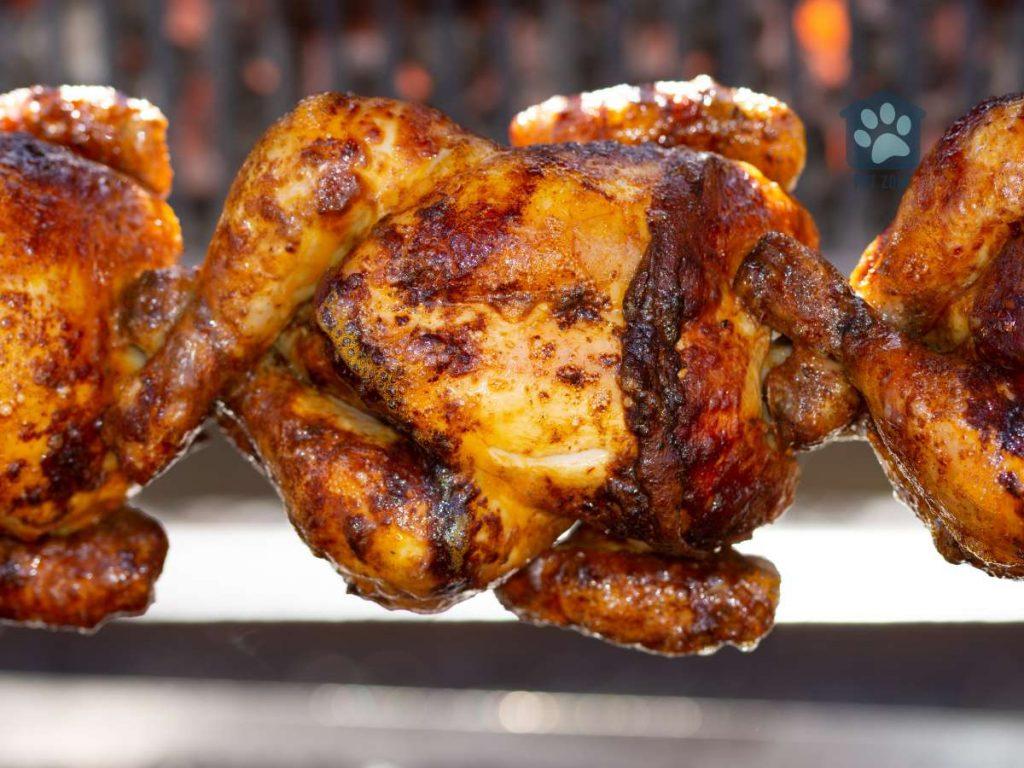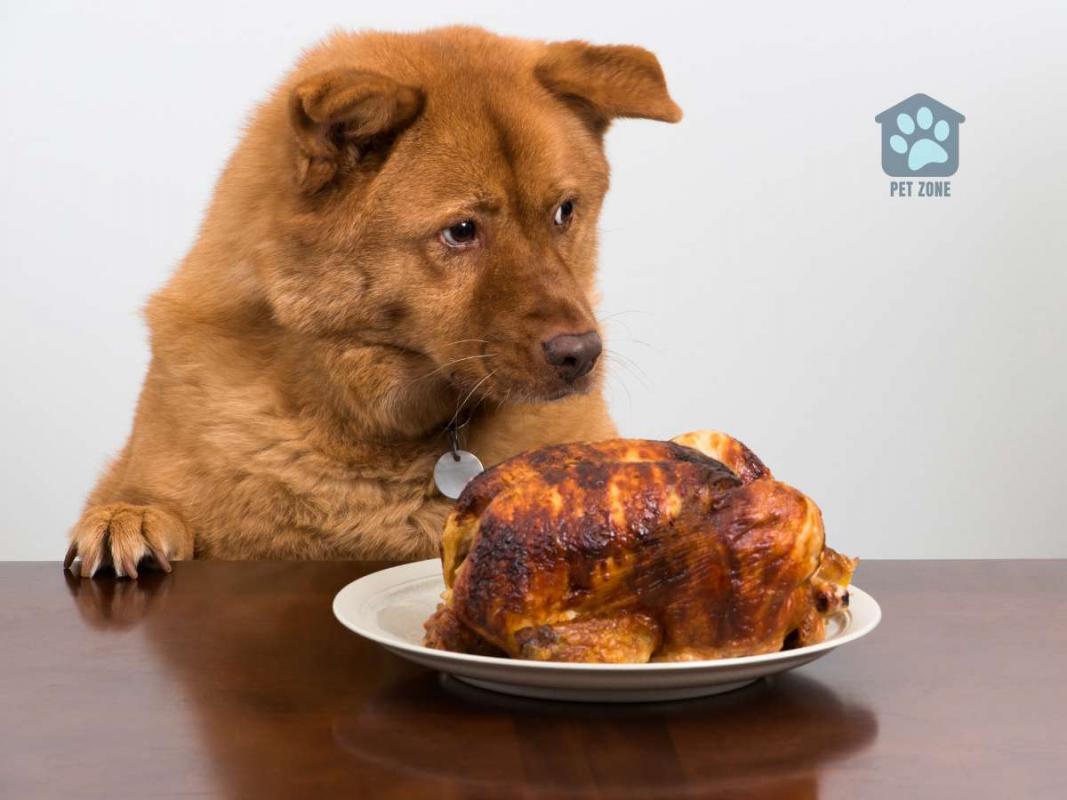Estimated reading time: 6 minutes
As dog owners, we’re often on the lookout for ways to spice up our furry friends’ meals while ensuring they get all the nutrients they need. And what better way to do that than with a source of protein dogs love – chicken!
Rotisserie chickens, with their rich flavor and enticing aroma, can be particularly tempting as a treat or supplement to traditional dry dog food. But can dogs eat rotisserie chicken safely? And how much rotisserie chicken is appropriate for your dog to eat?
Before you feed your dog a slice from that whole chicken you picked up from your local store, it’s essential to consider the chicken’s preparation, specifically regarding chicken skin and bones.
This article will delve into the dos and don’ts of feeding your dog rotisserie chicken, the potential risks, and the healthy ways to include chicken in your dog’s diet.
Key Points
Is It Safe to Feed My Dog Rotisserie Chicken?
The meat of the chicken, when separated from the skin and bones, is safe for dogs to eat.
Chicken is an excellent source of protein for dogs. It is usually high in essential amino acids found in chicken, which supports your dog’s muscle development and upkeep.
Rotisserie Chicken vs. Dog Food in a Balanced Diet
Whether dry or canned, traditional dog food is formulated with a canine’s nutritional needs in mind. It provides a balanced mix of proteins, carbohydrates, fats, vitamins, and minerals that your dog needs for optimal health.
Manufacturers also account for factors like age, breed, size, and health condition when crafting these formulas. Dog food is, therefore, a more complete source of nutrition for your dog, ensuring that they get a balanced diet every day.
On the other hand, when prepared appropriately, rotisserie chicken can be seen more as a supplement than a staple in a dog’s diet. While chicken meat is an excellent source of protein and can be beneficial for dogs, it doesn’t provide the comprehensive nutritional content that a specially formulated dog food does.
Precautions Before You Give Your Dog Rotisserie Chicken
The way a rotisserie chicken is cooked and served could pose some risks. Rotisserie chicken skin is often seasoned, and some of these seasonings may be harmful to dogs.
Many store-bought rotisserie chickens are loaded with flavor enhancers, preservatives, and high levels of sodium, which can be toxic to dogs.
Remove the Skin
The skin of the rotisserie chicken may be marinated or coated in seasonings which could be harmful to dogs. Onion and garlic, common in many seasonings, are particularly toxic to dogs.
Always remove the skin and rinse the meat thoroughly to get rid of any residual spices.
Remove the Bones
Cooked chicken bones can splinter and pose a significant choking hazard to dogs. Always remove the cooked bones before serving rotisserie chicken to your dog.
Remember, it’s not only the large bones you should worry about – small or fragmented bones can be just as dangerous.
Store-Bought Chicken
Store-bought rotisserie chickens often contain high levels of sodium and other preservatives, which are not good for dogs. Instead, consider preparing a plain, unseasoned chicken at home if your dog has a craving for poultry.

Healthy Ways to Add Chicken to Your Dog’s Diet
Cooked, unseasoned chicken
To ensure safety and wholesomeness, cook a chicken from your local market at home without using any seasoning. Remember, dogs do not need salts or spices to enjoy their food. This chicken, unlike store-bought rotisserie chickens, will be free from harmful additives.
Rotisserie chicken as a treat
As we’ve discussed, free from skin and bones, rotisserie chicken might fit as a good source of protein and an enjoyable treat for your dog. This doesn’t mean a whole rotisserie chicken; a small amount of rotisserie chicken meat can be an exciting reward for good behavior.
Mixed with dry food
Adding chicken meat to your dog’s regular dry dog food can make mealtime more appealing. This can be particularly useful if your dog is a picky eater or has lost some of their appetite due to age or illness.
Chicken broth
Another way to incorporate chicken into your dog’s diet is through homemade chicken broth. Ensure it’s free from onions, garlic, and heavy salts, which can be toxic to dogs. Chicken broth can be added to dry food for extra flavor or served cool as a refreshing treat.
Chicken and vegetable stew
A stew made from chicken and dog-friendly vegetables like peas and carrots can be a healthy addition to your dog’s diet. This not only adds to the nutritional value of chicken but also the vitamins and fiber present in vegetables.
Chicken-based dog food
Many quality dog food brands offer chicken-based products. These foods are balanced to provide all the nutrients your dog needs, with chicken as the primary source of protein.
Conclusion
Feeding your dog rotisserie chicken might seem like a simple enough proposition, given how much dogs love the taste and the fact that chicken meat is a great source of protein. However, there are several considerations to take into account.
From removing the skin and bones to ensuring the chicken is cooked without harmful seasoning, every aspect plays a crucial role in whether or not it’s suitable for dogs. Even the amount of chicken served matters; too much chicken, even when safe, can upset a dog’s nutritional balance.
Moreover, while dogs can eat cooked chicken, serving them a whole rotisserie chicken isn’t recommended. Dogs shouldn’t consume regularly a diet based solely on rotisserie chicken, as it does not provide all the nutrients a dog needs. Rotisserie chicken can also be higher in sodium and fats, which, if fed too often, could lead to health issues such as pancreatitis in dogs.
And while many dog owners might like the idea of giving their dog rotisserie chicken as a part of their meal, it’s always better to consult with a professional before making significant dietary changes. What might seem like a harmless addition to your pup’s meals could be the part that you shouldn’t feed your dog.
In the end, the key to a healthy dog diet is balance. Chicken can be a part of your dog’s diet, but it should never replace the balanced nutrition that they get from specially formulated dog food. With care and caution, you can ensure that your dog enjoys their meals while still getting the nutrition they need.








